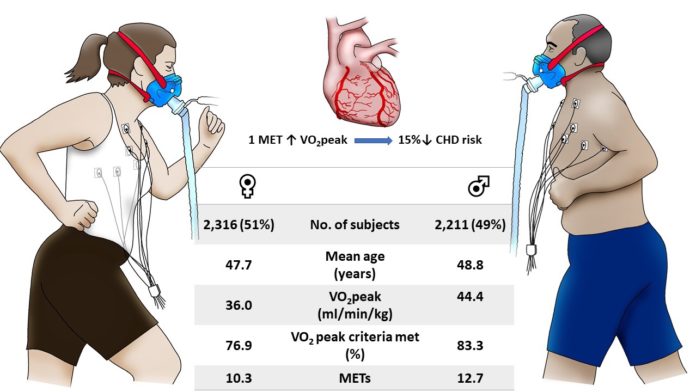Even if you have no heart or blood vessel disease, low cardiorespiratory fitness is a warning sign
Even if you are a fit and healthy person with no signs of any heart or blood vessel disease, low cardiorespiratory fitness could be a warning sign of future problems.
According to a study published in the European Heart Journal, cardiorespiratory fitness is crucial for long term health.
Cardiorespiratory fitness refers to the ability of the blood circulation and respiratory systems to supply adequate oxygen to muscles during sustained physical activity. The main measure of it is VO2max – the maximum rate of oxygen consumption during exercise that increases with intensity.
For both men and women, the risk of cardiovascular problems fell by 15% for every extra unit of measurement of cardiorespiratory fitness – metabolic equivalents (METs)
In the study published today, 4527 fit and healthy men and women with no history of cardiovascular or lung disease, cancer or raised blood pressure, had their cardiorespiratory fitness assessed. They joined a large, population-based health study in Norway (the HUNT3 study) between 2006-2008. Wearing a face mask and a heart rate monitor, they warmed up for ten minutes on a treadmill before running faster and faster. Their oxygen intake was measured to establish their VO2max.
The researchers also gathered information on tobacco use, alcohol consumption, family history of cardiovascular disease, physical activity, weight, height and waist circumference, blood pressure and cholesterol levels.
After an average follow-up time of nearly nine years, the researchers found that greater cardiorespiratory fitness was linked to a lower risk of cardiovascular disease, such as heart attacks. Only 147 participants (3.3%) were diagnosed with heart disease or died from it, or required intervention to unblock clogged arteries during this period.
“We found a strong link between greater fitness and reduced risk of a coronary event during the nine years of follow-up in a very healthy sample of adults,” said Dr Bjarne Nes, a researcher at the Norwegian University of Science and Technology (NTNU). “In fact, the participants who were in the 25% of those with the highest cardiorespiratory fitness had nearly half the risk compared to those in the 25% with the lowest fitness levels.”
The researchers found that, in both men and women, the risk of cardiovascular problems fell by 15% for every extra unit of measurement of cardiorespiratory fitness – metabolic equivalents (METs).
METs measure the oxygen required for the energy expended on physical activity, with one MET being the amount needed if a person is sitting quietly (3.5 mL of oxygen per kg of body weight per minute), while high exertion such as running would use about eight METs.


